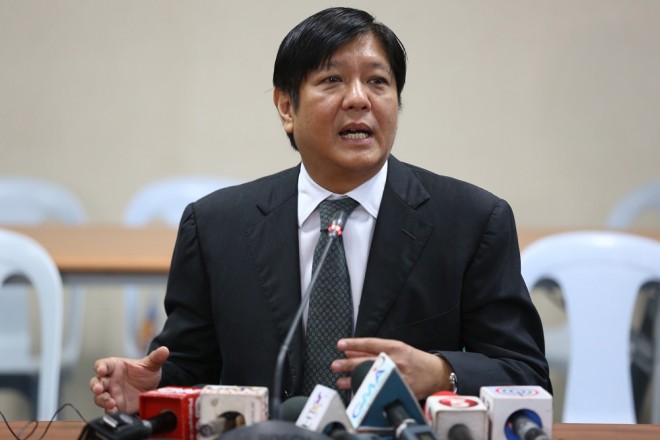The son of the late strongman Ferdinand Marcos on Wednesday said he would run for “higher office” next year, offering his once-exiled family the chance of the ultimate political comeback.
Sen. Ferdinand Marcos Jr., also known as Bongbong, said he would not seek a second term as senator and was aiming for higher office, which can only mean either the vice presidency or the presidency.
“The discussions I have been having with different groups, with other individuals have really centered on higher office,” Marcos, 57, told Karen Davila of ANC’s Headstart on Wednesday.
Asked directly if he would run for Vice President or President, Marcos said: “It’s extremely difficult to make a decision at this point.”
Marcos’ father ruled the Philippines with an iron hand for two decades until 1986, when millions of people took to the streets and toppled him from power in what is now known as Edsa People Power Revolution.
The Marcos family fled to the United States, and the patriarch died in Hawaii in 1989.
Political comeback
The rest of the family, headed by the controversial matriarch Imelda Marcos, returned in 1991 and began a successful political comeback despite accusations that the late strongman and the former first lady stole billions from state coffers and accused of widespread human rights violations.
Bongbong Marcos won a seat in the Senate in 2010, the first time since his father’s death that a family member had won a nationally elected post.
Imelda Marcos, known for her luxurious lifestyle when she was in Malacañang, has also been a member of the House of Representatives, representing her husband’s stronghold of Ilocos Norte province since 2010.
Now 86, Imelda Marcos has spoken often of her desire for her son to bring the presidency back to the family.
Public opinion polls, however, show there is little support for Bongbong Marcos as President.
“I always see surveys as a starting point,” Marcos said about his poor poll ratings.
President Aquino is the only son and namesake of the late strongman’s political nemesis, whose assassination in 1983 led to the popular uprising three years later.
Sen. Benigno “Ninoy” Aquino Jr.’s widow, Corazon Aquino, led the 1986 revolution and became the nation’s first President after Marcos’ fall.
Highlighting the fickleness of Philippine politics, Bongbong Marcos said he could run for Vice President next year on a ticket with Vice President Jejomar Binay who, together with the late President Aquino and her family, fought the Marcos dictatorship.
Corruption charges
Binay was a human rights campaigner, and is now the leader of the opposition. He is the second favorite in the voter preference polls for President, but he is facing accusations of corruption during his three terms as mayor of Makati City.
Binay has floated the idea of tapping Bongbong Marcos as his running mate, and the senator said Wednesday that he was “open to anything at this point.”
“I always say this is Philippine politics and you cannot discount the possibility of things you did not imagine would happen,” Marcos said when asked about Binay’s idea.
“Never say never when it comes to politics,” Marcos said.
Binay, who quit the Cabinet in June, was in Ilocos Norte on Wednesday to visit villages in Pagudpud, Burgos and Pasuquin towns ravaged by Typhoon “Ineng” (international name: Goni) with Gov. Imee Marcos, Senator Marcos’ sister.
Asked by reporters who his running mate would be, Binay said it was still a “secret.”
Binay said the search committee of his United Nationalist Alliance party that looked for potential running mates for him had completed its job.
“We are now in the selection stage. This means we have now warm bodies being talked to,” Binay said.
Asked if Marcos was among the candidates, Binay said: “He could be, of course. You know I want to be remembered, even right now, to be a unifying and healing executive officer.”
In his television interview, Marcos said a hankering for his father’s programs and the emergence of a younger generation of Marcos “loyalists” were among the reasons that spurred him to aim for higher office.
“I think it is the history in recent years, the political history in recent years, and the constant refrain that ‘It was better during the time of Marcos, our lives were better, the government was helping us, there were lots of programs and projects. Since he was replaced, there was nothing like that and we hope it returns.’ That is the general sentiment,” Marcos said.
He also said there was a “new phenomenon” in which younger people, including students and those who have just entered the labor force, were declaring themselves for Marcos.
Some of them say they are for Marcos because their fathers supported the late strongman, he said.
“That’s a new development so it’s very hard to estimate. [But] we can be confident there is now an Ilocano vote again. After 1986, the so-called Solid North was gone, but in 2010 we could see it was returning,” he said.
Asked whether he would apologize for the atrocities attributed to his father, Marcos said that if there had been atrocities, he did not want these to happen.
“We have constantly said if during the time of my father there were those who were affected, or who were not helped, or they were victimized in some way or another, of course, we’re sorry that it happened. Nobody wants that to happen. These are instances that have fallen through the cracks,” he said.—Leila B. Salaverria; With reports from Christine O. Avendaño and AFP
RELATED STORIES
Binay-Marcos in 2016? Bongbong says why not?
Bongbong ‘apologizes’ to victims of Marcos regime
